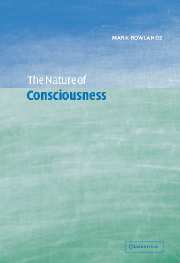Book contents
- Frontmatter
- Contents
- Preface
- 1 The problem of phenomenal consciousness
- 2 Consciousness and supervenience
- 3 The explanatory gap
- 4 Consciousness and higher-order experience
- 5 Consciousness and higher-order thoughts
- 6 The structure of consciousness
- 7 What it is like
- 8 Against objectualism II: mistakes about the way things seem
- 9 Consciousness and representation
- 10 Consciousness and the natural order
- Bibliography
- Index
5 - Consciousness and higher-order thoughts
Published online by Cambridge University Press: 22 September 2009
- Frontmatter
- Contents
- Preface
- 1 The problem of phenomenal consciousness
- 2 Consciousness and supervenience
- 3 The explanatory gap
- 4 Consciousness and higher-order experience
- 5 Consciousness and higher-order thoughts
- 6 The structure of consciousness
- 7 What it is like
- 8 Against objectualism II: mistakes about the way things seem
- 9 Consciousness and representation
- 10 Consciousness and the natural order
- Bibliography
- Index
Summary
Higher-order thought (HOT) models of consciousness have been developed by Rosenthal (1986, 1990, 1993), Carruthers (1996, 1998), Gennaro (1996) and Natsoulas (1992), among others. According to such models, very roughly, a given mental state M is conscious if, and only if, the subject of that state possesses a thought about M, a thought to the effect that she has, or is in, M. Most attacks on the HOT model have tended to focus on the rather unfortunate entailments this account has, or is thought to have. Thus, Dretske (1995) argues, plausibly, that HOT theories rule out the possession of consciousness by non-human animals and children below the age of about three. I concur with these criticisms. However, in this chapter I shall argue that HOT accounts of consciousness face even deeper problems, problems of logical coherence. More precisely, I shall argue that HOT models face at least two distinct logical problems: circularity and regress. My focus will be provided by the developments of the model associated with Rosenthal and Carruthers, since these are probably the most well known, although similar arguments, I believe, apply to any of the theoretical articulations of this general account.
At the outset, however, a preliminary point concerning the status of HOT models is required. On the face of it, HOT models seem to sit rather uneasily on the borderline between two distinct endeavours, one conceptual, one ontological.
- Type
- Chapter
- Information
- The Nature of Consciousness , pp. 101 - 121Publisher: Cambridge University PressPrint publication year: 2001



